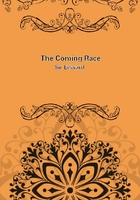
第41章
"But," said I, "when, I suppose yearly, a certain number among 94you agree to quit home and found a new community elsewhere, they must necessarily be very few, and scarcely sufficient, even with the help of the machines they take with them, to clear the ground, and build towns, and form a civilised state with the comforts and luxuries in which they had been reared.""You mistake. All the tribes of the Vril-ya are in constant communication with each other, and settle amongst themselves each year what proportion of one community will unite with the emigrants of another, so as to form a state of sufficient size; and the place for emigration is agreed upon at least a year before, and pioneers sent from each state to level rocks, and embank waters, and construct houses; so that when the emigrants at last go, they find a city already made, and a country around it at least partially cleared. Our hardy life as children make us take cheerfully to travel and adventure. I mean to emigrate myself when of age.""Do the emigrants always select places hitherto uninhabited and barren?""As yet generally, because it is our rule never to destroy except when necessary to our well-being. Of course, we cannot settle in lands already occupied by the Vril-ya; and if we take the cultivated lands of the other races of Ana, we must utterly destroy the previous inhabitants. Sometimes, as it is, we take waste spots, and find that a troublesome, quarrelsome race of Ana, especially if under the administration of Koom- Posh or Glek-Nas, resents our vicinity, and picks a quarrel with us; then, of course, as menacing our welfare, we destroy it: there is no coming to terms of peace with a race so idiotic that it is always changing the form of government which represents it. Koom-Posh," said the child, emphatically, "is bad enough, still it has brains, though at the back of its head, and is not without a heart; but in Glek-Nas the brain and heart of the creatures disappear, and they become all jaws, claws, and belly."95"You express yourself strongly.Allow me to inform you that Imyself, and I am proud to say it, am the citizen of a Koom-Posh.""I no longer," answered Taee, "wonder to see you here so far from your home. What was the condition of your native community before it became a Koom-Posh?""A settlement of emigrants- like those settlements which your tribe sends forth- but so far unlike your settlements, that it was dependent on the state from which it came. It shook off that yoke, and, crowned with eternal glory, became a Koom-Posh.""Eternal glory!How long has the Koom-Posh lasted?" "About 100 years.""The length of an An's life- a very young community. In much less than another 100 years your Koom-Posh will be a Glek-Nas.""Nay, the oldest states in the world I come from, have such faith in its duration, that they are all gradually shaping their institutions so as to melt into ours, and their most thoughtful politicians say that, whether they like it or not, the inevitable tendency of these old states is towards Koom- Posh-erie.""The old states?" "Yes, the old states."
"With populations very small in proportion to the area of productive land?""On the contrary, with populations very large in proportion to that area.""I see! old states indeed!- so old as to become drivelling if they don't pack off that surplus population as we do ours- very old states!- very, very old! Pray, Tish, do you think it wise for very old men to try to turn head- over-heels as very young children do? And if you ask them why they attempted such antics, should you not laugh if they answered that by imitating very young children they could become very young children themselves? Ancient history abounds with instances of this sort a great many thousand years ago- and in every instance a very 96old state that played at Koom-Posh soon tumbled into Glek-Nas. Then, in horror of its own self, it cried out for a master, as an old man in his dotage cries out for a nurse; and after a succession of masters or nurses, more or less long, thatvery old state died out of history. A very old state attempting Koom- Posh-erie is like a very old man who pulls down the house to which he has been accustomed, but he has so exhausted his vigour in pulling down, that all he can do in the way of rebuilding is to run up a crazy hut, in which himself and his successors whine out, 'How the wind blows! How the walls shake!'""My dear Taee, I make all excuse for your unenlightened prejudices, which every schoolboy educated in a Koom-Posh could easily controvert, though he might not be so precociously learned in ancient history as you appear to be.""I learned! not a bit of it. But would a schoolboy, educated in your Koom-Posh, ask his great-great-grandfather or great-great-grandmother to stand on his or her head with the feet uppermost? And if the poor old folks hesitated- say, 'What do you fear?- see how I do it!'""Taee, I disdain to argue with a child of your age. I repeat, I make allowances for your want of that culture which a Koom-Posh alone can bestow.""I, in my turn," answered Taee, with an air of the suave but lofty good breeding which characterises his race, "not only make allowances for you as not educated among the Vril-ya, but I entreat you to vouchsafe me your pardon for the insufficient respect to the habits and opinions of so amiable a Tish!"I ought before to have observed that I was commonly called Tish by my host and his family, as being a polite and indeed a pet name, literally signifying a small barbarian; the children apply it endearingly to the tame species of Frog which they keep in their gardens.